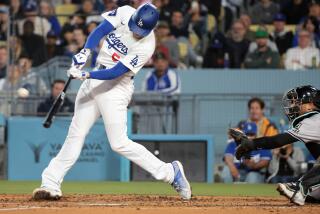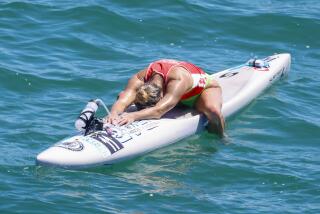Freeman Hopes Long Ride Will Lead to Longer Ride
- Share via
Why would anyone enter a bicycle race that takes him 542 miles across blazing desert, treacherous terrain and sub-freezing mountains? For Kirk Freeman of Newhall, there’s only one reason: He hopes to finish fast enough to qualify for a race that will put 3,100 more miles on his tires and give him a lesson in American geography.
Freeman is among 48 ultra-marathon cyclists in the John Marino Open, a nonstop race from Tucson to Flagstaff and back that starts today at 11 a.m. It is a qualifier for next year’s prestigious Race Across America, which stretches from Huntington Beach to Atlantic City, N.J.
“The accomplishment of doing the Race Across America would satisfy me for the rest of my life,” said Freeman, a 33-year-old graphics executive at Warner Bros.
Less than a third of the competitors in the open are expected to finish the race--which should take the winner at least 32 hours--and merely finishing within the cutoff time of 52 hours is considered a major accomplishment. Most of the top 12 finishers will qualify for the Race Across America.
John Marino, who founded the Race Across America, believes that the open challenges a cyclist’s survival instincts.
“It tests their overall strength,” he said. “Sometimes a rider has great cycling skill, but when he gets in this kind of event he isn’t ready for rapid climate changes--the rain, the heat and the sudden cold.”
To prepare for the open, Freeman has been cycling 400 to 600 miles a week, mostly on the weekends and at night after work. One regular training route, about 160 miles from Van Nuys to Wrightwood and back, takes about 12 hours. His longest previous nonstop ride was the 300-mile L.A. Wheelmen Grand Tour--from Malibu to Ojai and Santa Barbara and back--which he did on July 27 in 18 hours.
“I felt fine,” he said. “I didn’t feel any particular strains.”
But it will be different trying to stay awake for more than 30 hours in the Arizona race.
“It’s something you have to do to know if you can do it,” Freeman said. “You don’t practice doing it beforehand.”
More to Read
Sign up for Essential California
The most important California stories and recommendations in your inbox every morning.
You may occasionally receive promotional content from the Los Angeles Times.












